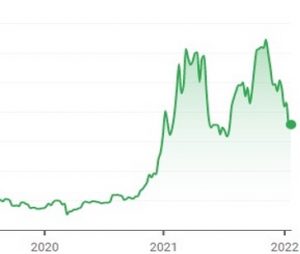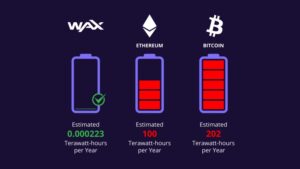Reading Time: 6 minutes
When it comes to the finance sector and the climate crisis a transition to greener ways is inevitable. If the risks are underestimated, then the opportunities are vastly undervalued at this point in time. A move to a model supporting green finance will be a true game changer for financial products and services.
We are now well and truly over the edge when it comes to CO2 emissions and the effects they are having on the planet. You don’t need to look far, just turn on the national news, to see the extreme climate events happening all around the world. Devastating wildfires and floods causing evacuation orders across towns and villages from the US to China to Germany. Everywhere you look the impact is clear and the message from nature is forceful; stop emitting carbon dioxide into the atmosphere or lives will be threatened. It couldn’t be clearer.
The tipping point has been reached. Now we must rely on forward thinking innovators with growth mindsets to imagine ways of a greener future. So what role does green finance have to play in all this? Basically, the same as everything else, when it comes to the creation of money we need to rethink the materials used, the methods of exchange and carefully investigate the cost of the current situation versus a shift to an alternative means of finance, i.e. Bitcoin and cryptocurrencies.
It is at this point that well meaning but ultimately ill informed people point to the energy consumption of Bitcoin. Examples are thrown out that to run the Bitcoin ecosystem is in excess of the total consumption of a small Scandinavain country. Well, we have news for you — running the fiat ecosystem is far more costly than that again.
Typically critics make the mistake of comparing the Bitcoin ecosystem with transactions on a Visa card, but this totally ignores the tens of thousands of fiat bank branches and ATMs scattered around the world. It ignores the fact that in the US alone some 8.4% of the gross domestic product comes from Finance and Insurance, only marginally behind manufacturing, and with that comes all the energy consumption in skyscrapers, people commuting, laptops and call centres.
Tack on that the fact that fiat money causes a recession every 6 years or so with the accompanying economic and human toil — and yes the destruction of value that cost an enormous amount of carbon to create.
As the transition to net zero becomes more urgent than ever, all financial firms must invest in greener products and services. From loans to investments to underwriting insurance, greening the financial system is a key component of the climate change targets of keeping a global temperature rise this century well below 2 degrees Celsius above pre-industrial levels.
According to the CDP, the gold standard of environmental reporting, “To continue to thrive, financial institutions will need to align their portfolios with a net zero carbon world”. Luckily “76% of financial institutions see opportunities in offering sustainable finance products and services”. Seeing these opportunities to offer more sustainable finance options will be important when trying to attract customers from a world where we are all hyper conscious of the impact our actions are having on the environment around us.
To get an accurate picture of the impact our finance is having we need to carefully review all currencies. The infrastructure that is used to create FIAT money and allow FIAT money to operate in society is enormous. From bank branches to the repercussions of hyperinflation and lack of supply in the case of recessions. The knock on effects of FIAT are so damaging that it would be difficult to compare the carbon impacts of both forms of currency.
Bitcoin by comparison is one of the most green technologies ever invented. Bitcoin miners chase the cheapest energy possible and in essence are in the business of energy arbitrage — unlike the fat old consumers of central banks that pollute the world. Bitcoin miners push the boundaries of renewables, live at the edge of grids harvesting waste energy and seek out energy about to be lost — like flares from natural gas production. And that’s just the proof of work miners — generation two blockchains operate on proof of stake models which are carbon neutral from the get go. And moreover cryptocurrencies have the potential to help the unbanked and disenfranchised of this world — at what price humanity?
There are two ways that we need to be thinking about the future of Green Finance, either fiat or cryptocurrency. Firstly, thinking practically will be key. Let’s walk through an easy example. You decide that you want to invest in a clean energy solution for your new home extension. You add three solar panels to your roof. However you pay for these panels with FIAT currency that has already proven to damage the native tree population. Secondly, thinking creatively should drive some innovation, offering opportunities for the development of sustainable finance products and services. Why not consider decentralised finance as an alternative way to support natural ecosystems? A clear example here is the Sphere product from Sonic Capital that actively rewards investors for investing in positive climate change solutions. Stefan Rust from Sonic Capital believes that “the future of finance cannot be left in the hands of a few, it must be inclusive and open to the world of defi innovations that are now heavily invested in and tackling climate change issues”. Why should the focus be on preserving traditional industry norms when others are working hard to preserve natural ecosystems and biodiversity?
“Globally, the total economic value of ecosystem services is estimated to be between US$125 and 140 trillion per year. In 2020, the total potential financial impact of water risks reported to CDP was up to US$333 billion. These numbers paint a compelling case for financial institutions to consider nature in financial decisions.”
With these kinds of numbers, investing in nature becomes an obvious choice. Regen Network founder Christian Shearer believes that “Having a neutral store of ecological data will allow for the development of a suite of financial products. We have started with a carbon credit registry but the potential is huge and we are ready to tackle the climate change issues facing us head on”. It is important that all financial institutions are researching ways to align their portfolios for net zero.
At their very core digital currencies are made to operate easily online with little requirement for intermediaries. Additionally, to ensure that everyone remains focused on addressing the climate issues, a private sector-led initiative for the entire crypto community focused on decarbonizing the cryptocurrency industry in record time.
The two objectives set out by the accord are ambitious and worth mentioning:
Objective 1: Achieve net-zero emissions from electricity consumption for CCA Signatories by 2030.
Objective 2: Develop standards, tools, and technologies with CCA Supporters to accelerate the adoption of and verify progress toward 100% renewably-powered blockchains by the 2025 UNFCCC COP30 conference.
One recommendation in the CDP financial services report states that Putting in place incentives, especially monetary ones, for managing climate-related issues well is likely to improve outcomes, as it gives the executives responsible a stake in the outcomes. “Currently only 21% of financial institutions incentivise portfolio alignment to climate related objectives’’. Increasing this percentage could have a substantial impact on the outcomes for climate change. Although incentives are noteworthy for all those responsible for climate related issues, the records of climate objectives and achievements within the finance sector will require transparent oversight. To ensure that both the goals are being met with regards to climate initiatives and also that the incentives are fair for all parties involved. Again, blockchain technology is available to be utilised to assist in providing this transparency.
Furthermore, the CDP reports that it is important the green finance frameworks remain rigorous. If not, they may be open to accusations of greenwashing. Using climate change and CSR as marketing spin is a big no, no today. Companies that are found to be misleading the public with their environmental initiatives will be heading towards massive costs for damage control. Greenwashing in the finance sector is even more risky as it can ruin the integrity of your financial products, having a knock on effect of making investors scared to invest. A lack of trust is the last thing you want if you are selling a financial service. With blockchain technology this ‘greenwashing’ becomes much easier to manage and there is no more hiding behind marketing.
Now that there is heightened pressure to reach net zero emissions coming from the public, investors need to show that they are bullish on climate action and take advantage of the opportunities offered with these trends towards ESG. One positive statistic coming from the CDP report is that “49% of the financial institutions disclosing to CDP indicate they have developed a low carbon transition plan”. Planning will be crucial but action is essential and the world is ready and waiting to support greener finance.
By adopting a growth mindset, learning about the benefits of blockchain technology and applying it to create greener financial products perhaps we will all feel as though we are working towards a safer, cleaner, more sustainable future.
We are living in an age of conscious consumerism and all industries must adapt to meet the values and needs of a greener future.
References
The Time to Green Finance CDP Financial Services Disclosure Report 2020
Hype Cycle for Blockchain 2021
Recommendations of the Task Force on Climate Related Financial Disclosures https://assets.bbhub.io/company/sites/60/2020/10/FINAL-2017-TCFD-Report-11052018.pdf
https://www.un.org/sustainabledevelopment/climate-change/
- 2020
- Action
- Adoption
- ADvantage
- All
- arbitrage
- around
- Bank
- Banks
- Billion
- Bitcoin
- blockchain
- blockchain technology
- Bullish
- business
- call
- capital
- carbon
- carbon dioxide
- Celsius
- Central Banks
- change
- chase
- China
- Climate change
- climate crisis
- coming
- community
- commuting
- Companies
- component
- Conference
- Consumers
- consumption
- continue
- Costs
- credit
- crisis
- crypto
- cryptocurrencies
- cryptocurrency
- currencies
- Currency
- Current
- Customers
- data
- DeFi
- develop
- Development
- digital
- digital currencies
- Economic
- ecosystem
- Ecosystems
- Edge
- electricity
- Emissions
- energy
- Environment
- environmental
- events
- exchange
- executives
- facing
- fair
- Fiat
- Fiat currency
- Fiat Money
- finance
- financial
- Financial institutions
- financial services
- Focus
- Forward
- founder
- future
- game
- GAS
- Germany
- Global
- Goals
- Gold
- Green
- Growth
- head
- here
- Home
- HTTPS
- huge
- Humanity
- hyperinflation
- Impact
- industries
- industry
- Infrastructure
- Initiative
- Innovation
- innovators
- institutions
- insurance
- investigate
- investing
- Investments
- Investors
- involved
- issues
- IT
- keeping
- Key
- learning
- Loans
- Making
- manufacturing
- Marketing
- materials
- Miners
- model
- money
- move
- Natural Gas
- net
- network
- news
- numbers
- offer
- offering
- online
- open
- opportunities
- Options
- orders
- Pay
- People
- picture
- planet
- planning
- portfolio
- pressure
- price
- private
- Product
- Production
- Products
- proof
- public
- recession
- records
- report
- Reports
- review
- Rewards
- Run
- running
- Services
- set
- shift
- small
- So
- Society
- solar
- solar panels
- Solutions
- Spin
- stake
- standards
- started
- States
- store
- supply
- support
- sustainable
- system
- task force
- Technologies
- Technology
- the world
- Thinking
- time
- Transactions
- Transparency
- Trends
- Trust
- UN
- unbanked
- us
- value
- Versus
- visa
- Water
- within
- Work
- world
- worth
- year
- years
- zero












